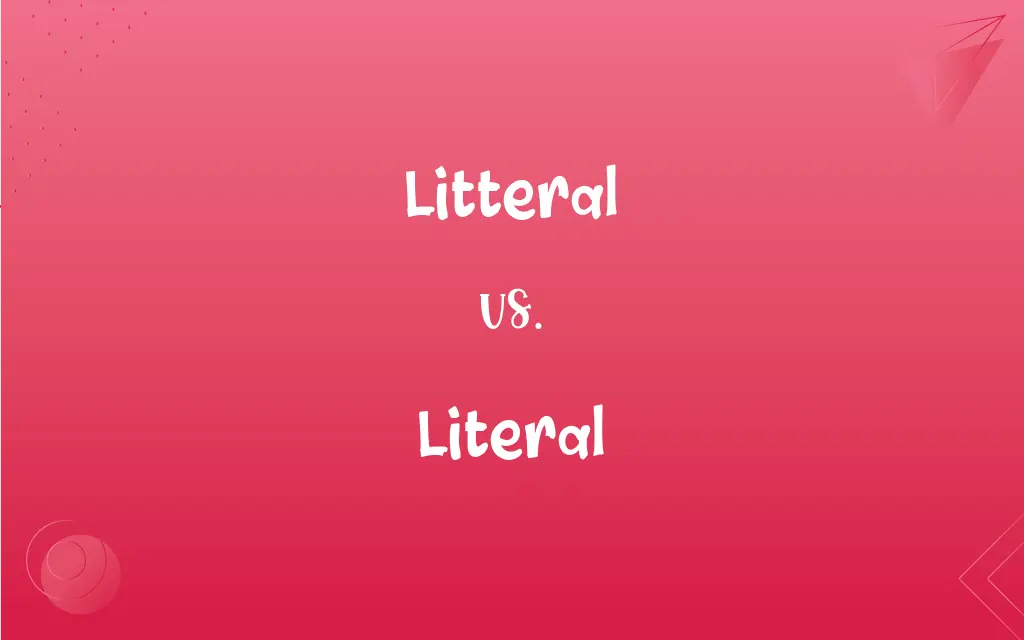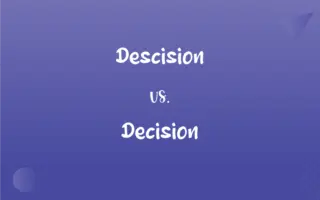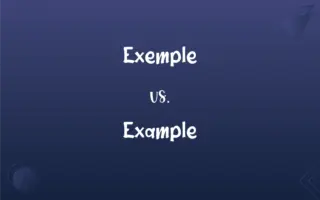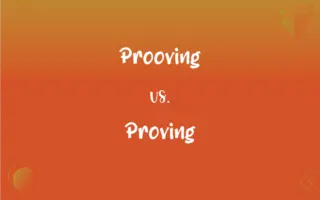Litteral vs. Literal: Mastering the Correct Spelling
Edited by Harlon Moss || By Janet White || Updated on March 8, 2024
"Litteral" is incorrect; the correct spelling is "Literal," which means exactly true, not exaggerated or metaphorical.

Which is correct: Litteral or Literal
How to spell Literal?

Litteral is Incorrect

Literal is Correct
ADVERTISEMENT
Key Differences
Use mnemonic: “Literally one T,” emphasizing the single 't'.
Remember "Literal" has one 't' like "literature," which also deals with words and meanings.
Associate "Literal" with "letter," focusing on the single 't' in both.
Think of "Literal" as "lit" (meaning illuminated) plus "eral," avoiding double 't's.
Note that "Literal" rhymes with "mineral," both having a single 't'.
ADVERTISEMENT
Correct usage of Literal
The translation was too litteral and lost the nuance.
The translation was too literal and lost the nuance.
He took her words as a litteral warning.
He took her words as a literal warning.
She had a litteral interpretation of the poem.
She had a literal interpretation of the poem.
His litteral understanding of the joke made it less funny.
His literal understanding of the joke made it less funny.
The litteral meaning of the word is different from its usage.
The literal meaning of the word is different from its usage.
Literal Definitions
Word for word; verbatim;
She gave a literal translation of the text.
Exactly true, without exaggeration or metaphor;
His interpretation of the rule was quite literal.
Concerning the letters of a script;
His literal understanding of the language was impressive.
Not imaginative; prosaic;
The author's literal description lacked creativity.
Following the exact words;
Her literal reading of the poem emphasized its rhythm.
Conforming or limited to the simplest, nonfigurative, or most obvious meaning of a word or words.
Word for word; verbatim
A literal translation.
Literal Sentences
Literal translation often fails to convey the cultural nuances of language.
The literal meaning of "it's raining cats and dogs" is not about pets falling from the sky.
He gave a literal account of the events that took place.
The scientist explained the process in literal terms for clarity.
The term "literal interpretation" refers to understanding words in their most basic sense.
The children's literal interpretations of the instructions were amusing.
Her fear of spiders was not just an expression; it was literal.
In a literal sense, a "butterfly" has nothing to do with butter or flying.
The phrase "break a leg" should not be taken in its literal meaning.
Literal-minded people might struggle with abstract concepts.
Literal thinking can sometimes hinder understanding figurative language.
A literal approach to historical texts can miss the underlying context.
He provided a literal translation, which sounded awkward in the target language.
The joke relied on a play of words rather than a literal interpretation.
The blueprint must be followed with literal accuracy to ensure safety.
The novel described the setting in such literal detail that it felt like being there.
Understanding the literal meaning of words is essential for learning a new language.
In math, the value of pi is often rounded to 3.14, but its literal value is much longer.
The warning was meant to be metaphorical, not literal.
She appreciated the literal depiction of nature in the painting.
Literal Idioms & Phrases
Literal translation
Translating words or texts word-for-word from one language to another, without considering context or idiomatic expressions.
Literal translations often fail to convey the original's tone or subtlety.
In the literal sense
Referring to the most direct or non-figurative meaning of a word or phrase.
In the literal sense, to kick the bucket simply involves tipping a bucket over.
Literal-minded
Having a tendency to interpret statements or words in their most basic sense.
Being literal-minded, he often missed the humor in sarcastic remarks.
Literal interpretation
Understanding words or texts in their most explicit sense without inferring any implied or metaphorical meaning.
His literal interpretation of the poem missed its symbolic richness.
Literal truth
The exact truth, without exaggeration, metaphor, or embellishment.
She was known for always telling the literal truth, even when it was blunt.
From a literal standpoint
Viewing or considering something strictly from its most explicit meaning.
From a literal standpoint, the instructions were correct, but they lacked practicality.
Literal description
A description that sticks strictly to the facts without embellishment or interpretation.
His literal description of the event was dry but accurate.
Take something at its literal value
To understand something only in its most basic or primary meaning without considering any deeper or implied significance.
You shouldn't take idiomatic expressions at their literal value.
Literal approach
Tackling a problem or task based on direct evidence or facts, without assuming anything beyond what is explicitly stated.
His literal approach to the mystery overlooked the possibility of hidden motives.
Literal-mindedness
The quality or condition of interpreting things only in their most direct meaning.
Literal-mindedness can be a barrier to enjoying poetry and metaphorical language.
Literal comprehension
The ability to understand the explicit meaning of words or texts.
Literal comprehension is the first step in developing reading skills.
Beyond the literal meaning
Looking deeper than the most straightforward or explicit interpretation.
To fully appreciate the artwork, you must go beyond the literal meaning.
Literal analogy
A comparison between two things that is direct and straightforward, without using figurative language.
His explanation used a literal analogy involving two well-known historical events.
Literal belief
A conviction in the truth of something based strictly on its explicit meaning.
His literal belief in the text led him to disregard any allegorical interpretations.
Literal rendition
A version of a song, work of art, or text that adheres strictly to the original.
The play's literal rendition captured the historical period's details accurately.
Literal sense of the word
The basic or primary meaning of a word, as opposed to its figurative or metaphorical meanings.
She was a star in the literal sense of the word, shining brightly in her field.
Literal interpretation rule
A guideline in legal interpretation that suggests words should be understood in their ordinary, everyday meanings.
The judge applied the literal interpretation rule to the statute.
Literal vs. figurative
The contrast between understanding words in their direct meaning versus interpreting them to represent something else.
The debate about the text was centered on its literal vs. figurative meanings.
FAQs
Why is it called literal?
It is called "literal" because it signifies the exact, word-for-word meaning, derived from Latin 'litteralis' relating to letters or literature.
What is the pronunciation of literal?
Literal is pronounced as /ˈlɪtərəl/.
What is the root word of literal?
The root word of "literal" is the Latin 'litteralis', meaning of or belonging to letters or literature.
Which vowel is used before literal?
The vowel 'i' is used before "literal".
What is the verb form of literal?
There is no verb form of "literal"; it's an adjective.
Which article is used with literal?
Both "a" and "the" can be used, depending on the context.
Is literal an adverb?
No, "literal" is not an adverb.
Which preposition is used with literal?
The preposition "in" is often used with "literal", as in "literal in meaning".
What is the plural form of literal?
The plural form is "literals".
Is literal an abstract noun?
"Literal" is not a noun; it's an adjective.
Which conjunction is used with literal?
Conjunctions like "and", "or", and "but" can be used with "literal".
Is literal a negative or positive word?
"Literal" is neutral; it can be positive or negative depending on context.
Is literal a vowel or consonant?
"Literal" is a word, not a vowel or consonant.
Is literal a collective noun?
No, "literal" is not a collective noun.
How do we divide literal into syllables?
It is divided as lit-er-al.
Which determiner is used with literal?
Determiners like "the", "a", "this", "that" can be used with "literal".
What is the singular form of literal?
The singular form is "literal".
Is literal a noun or adjective?
"Literal" is an adjective.
Is the literal term a metaphor?
"Literal" itself is the opposite of a metaphor; it means exactly what is said.
What part of speech is literal?
"Literal" is an adjective.
What is another term for literal?
Another term for "literal" is "verbatim".
What is the opposite of literal?
The opposite of "literal" is "figurative" or "metaphorical".
Is the word literal imperative?
No, "literal" is not used in the imperative form.
How many syllables are in literal?
There are three syllables in "literal".
How is literal used in a sentence?
Example: "Her account of the event was strictly literal, leaving no room for interpretation."
Is literal a countable noun?
"Literal" is not a noun; it's an adjective.
What is a stressed syllable in literal?
The stressed syllable in "literal" is the first one, 'lit'.
What is the first form of literal?
"Literal" does not have a verb form; it's an adjective.
What is the second form of literal?
There is no second form as "literal" is not a verb.
What is the third form of literal?
There is no third form as "literal" is not a verb.
About Author
Written by
Janet WhiteJanet White has been an esteemed writer and blogger for Difference Wiki. Holding a Master's degree in Science and Medical Journalism from the prestigious Boston University, she has consistently demonstrated her expertise and passion for her field. When she's not immersed in her work, Janet relishes her time exercising, delving into a good book, and cherishing moments with friends and family.
Edited by
Harlon MossHarlon is a seasoned quality moderator and accomplished content writer for Difference Wiki. An alumnus of the prestigious University of California, he earned his degree in Computer Science. Leveraging his academic background, Harlon brings a meticulous and informed perspective to his work, ensuring content accuracy and excellence.


































































